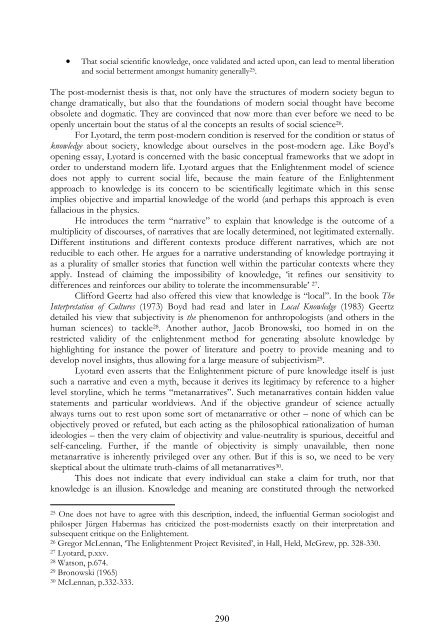Science, Strategy and War The Strategic Theory of ... - Boekje Pienter
Science, Strategy and War The Strategic Theory of ... - Boekje Pienter
Science, Strategy and War The Strategic Theory of ... - Boekje Pienter
You also want an ePaper? Increase the reach of your titles
YUMPU automatically turns print PDFs into web optimized ePapers that Google loves.
That social scientific knowledge, once validated <strong>and</strong> acted upon, can lead to mental liberation<strong>and</strong> social betterment amongst humanity generally 25 .<strong>The</strong> post-modernist thesis is that, not only have the structures <strong>of</strong> modern society begun tochange dramatically, but also that the foundations <strong>of</strong> modern social thought have becomeobsolete <strong>and</strong> dogmatic. <strong>The</strong>y are convinced that now more than ever before we need to beopenly uncertain bout the status <strong>of</strong> al the concepts an results <strong>of</strong> social science 26 .For Lyotard, the term post-modern condition is reserved for the condition or status <strong>of</strong>knowledge about society, knowledge about ourselves in the post-modern age. Like Boyd’sopening essay, Lyotard is concerned with the basic conceptual frameworks that we adopt inorder to underst<strong>and</strong> modern life. Lyotard argues that the Enlightenment model <strong>of</strong> sciencedoes not apply to current social life, because the main feature <strong>of</strong> the Enlightenmentapproach to knowledge is its concern to be scientifically legitimate which in this senseimplies objective <strong>and</strong> impartial knowledge <strong>of</strong> the world (<strong>and</strong> perhaps this approach is evenfallacious in the physics.He introduces the term “narrative” to explain that knowledge is the outcome <strong>of</strong> amultiplicity <strong>of</strong> discourses, <strong>of</strong> narratives that are locally determined, not legitimated externally.Different institutions <strong>and</strong> different contexts produce different narratives, which are notreducible to each other. He argues for a narrative underst<strong>and</strong>ing <strong>of</strong> knowledge portraying itas a plurality <strong>of</strong> smaller stories that function well within the particular contexts where theyapply. Instead <strong>of</strong> claiming the impossibility <strong>of</strong> knowledge, ‘it refines our sensitivity todifferences <strong>and</strong> reinforces our ability to tolerate the incommensurable’ 27 .Clifford Geertz had also <strong>of</strong>fered this view that knowledge is “local”. In the book <strong>The</strong>Interpretation <strong>of</strong> Cultures (1973) Boyd had read <strong>and</strong> later in Local Knowledge (1983) Geertzdetailed his view that subjectivity is the phenomenon for anthropologists (<strong>and</strong> others in thehuman sciences) to tackle 28 . Another author, Jacob Bronowski, too homed in on therestricted validity <strong>of</strong> the enlightenment method for generating absolute knowledge byhighlighting for instance the power <strong>of</strong> literature <strong>and</strong> poetry to provide meaning <strong>and</strong> todevelop novel insights, thus allowing for a large measure <strong>of</strong> subjectivism 29 .Lyotard even asserts that the Enlightenment picture <strong>of</strong> pure knowledge itself is justsuch a narrative <strong>and</strong> even a myth, because it derives its legitimacy by reference to a higherlevel storyline, which he terms “metanarratives”. Such metanarratives contain hidden valuestatements <strong>and</strong> particular worldviews. And if the objective gr<strong>and</strong>eur <strong>of</strong> science actuallyalways turns out to rest upon some sort <strong>of</strong> metanarrative or other – none <strong>of</strong> which can beobjectively proved or refuted, but each acting as the philosophical rationalization <strong>of</strong> humanideologies – then the very claim <strong>of</strong> objectivity <strong>and</strong> value-neutrality is spurious, deceitful <strong>and</strong>self-canceling. Further, if the mantle <strong>of</strong> objectivity is simply unavailable, then nonemetanarrative is inherently privileged over any other. But if this is so, we need to be veryskeptical about the ultimate truth-claims <strong>of</strong> all metanarratives 30 .This does not indicate that every individual can stake a claim for truth, nor thatknowledge is an illusion. Knowledge <strong>and</strong> meaning are constituted through the networked25 One does not have to agree with this description, indeed, the influential German sociologist <strong>and</strong>philosper Jürgen Habermas has criticized the post-modernists exactly on their interpretation <strong>and</strong>subsequent critique on the Enlightement.26 Gregor McLennan, ‘<strong>The</strong> Enlightenment Project Revisited’, in Hall, Held, McGrew, pp. 328-330.27 Lyotard, p.xxv.28 Watson, p.674.29 Bronowski (1965)30 McLennan, p.332-333.290
















